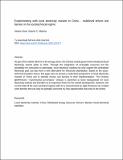| dc.contributor.author | Uhde, Helena | |
| dc.contributor.author | Malima, Gabriel C. | |
| dc.date.accessioned | 2021-05-27T10:46:01Z | |
| dc.date.available | 2021-05-27T10:46:01Z | |
| dc.date.issued | 2020-11 | |
| dc.identifier.uri | https://doi.org/10.1016/j.erss.2020.101577 | |
| dc.identifier.uri | https://dspace.nm-aist.ac.tz/handle/20.500.12479/1197 | |
| dc.description | This research article published by Elsevier Ltd., 2020 | en_US |
| dc.description.abstract | As part of its market reforms in the energy sector, the Chinese central government introduced local electricity market pilots in 2019. Through the integration of renewable resources and the possibility for consumers to participate, local electricity markets not only support the centralized electricity grid, but also form a new alternative for electricity distribution. Based on the socio-technical transition theory, this paper aims to present a multi-level perspective on local electricity markets in China and to identify drivers and barriers to their implementation. The Chinese government's “experimental governance” strategy is identified as niche management for local electricity markets and therefore as an important driver for the market development. However, the current state of the socio-technical regime with its is characterized by rigid structures has created some barriers that can only be partially overcome by new opportunities that arise in the niches. | en_US |
| dc.language.iso | en | en_US |
| dc.publisher | Elsevier Ltd. | en_US |
| dc.subject | Local electricity markets | en_US |
| dc.subject | Distributed energy resources | en_US |
| dc.subject | Socio-technical transition | en_US |
| dc.title | Experimenting with local electricity markets in China – multilevel drivers and barriers in the sociotechnical regime | en_US |
| dc.type | Article | en_US |

